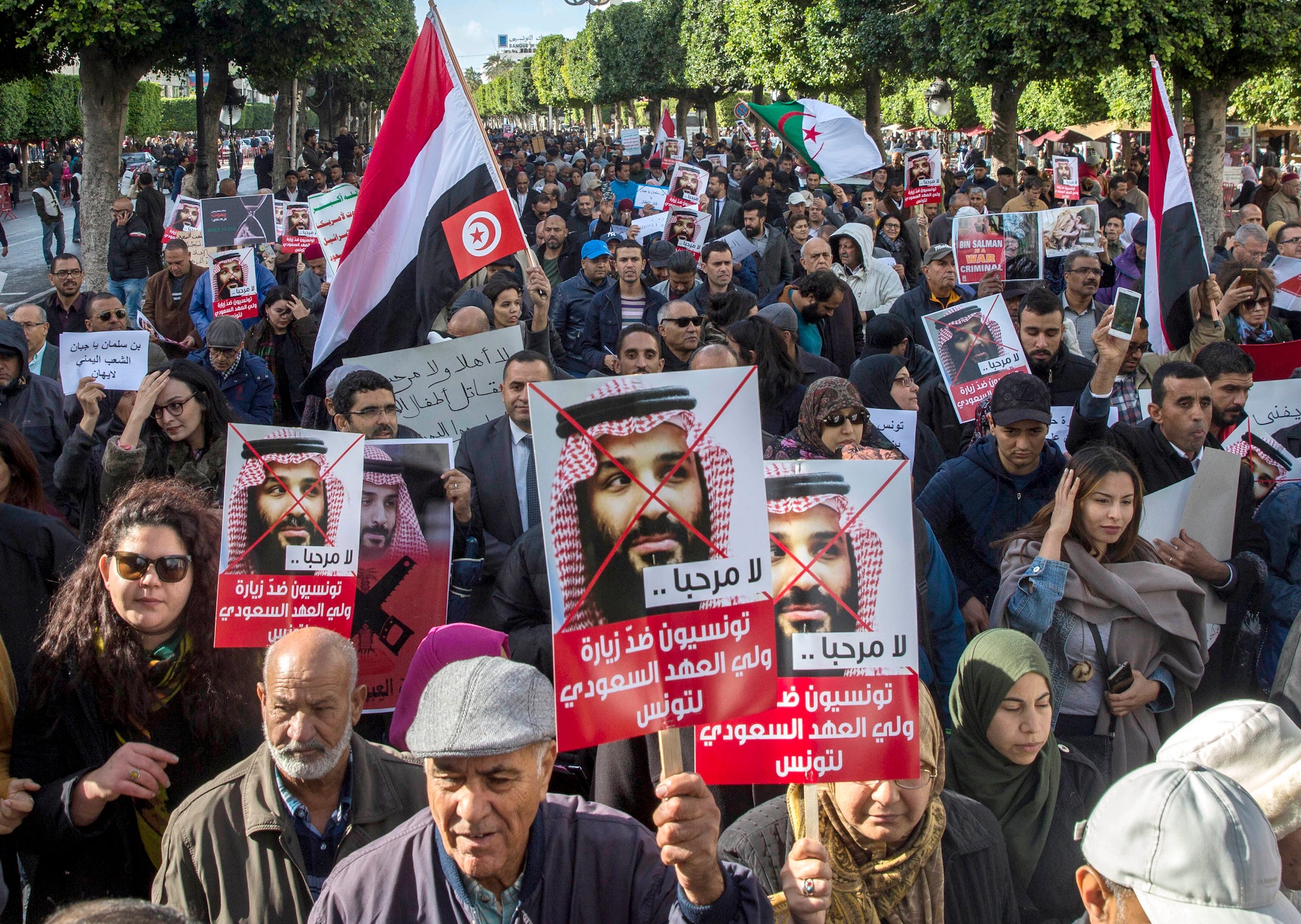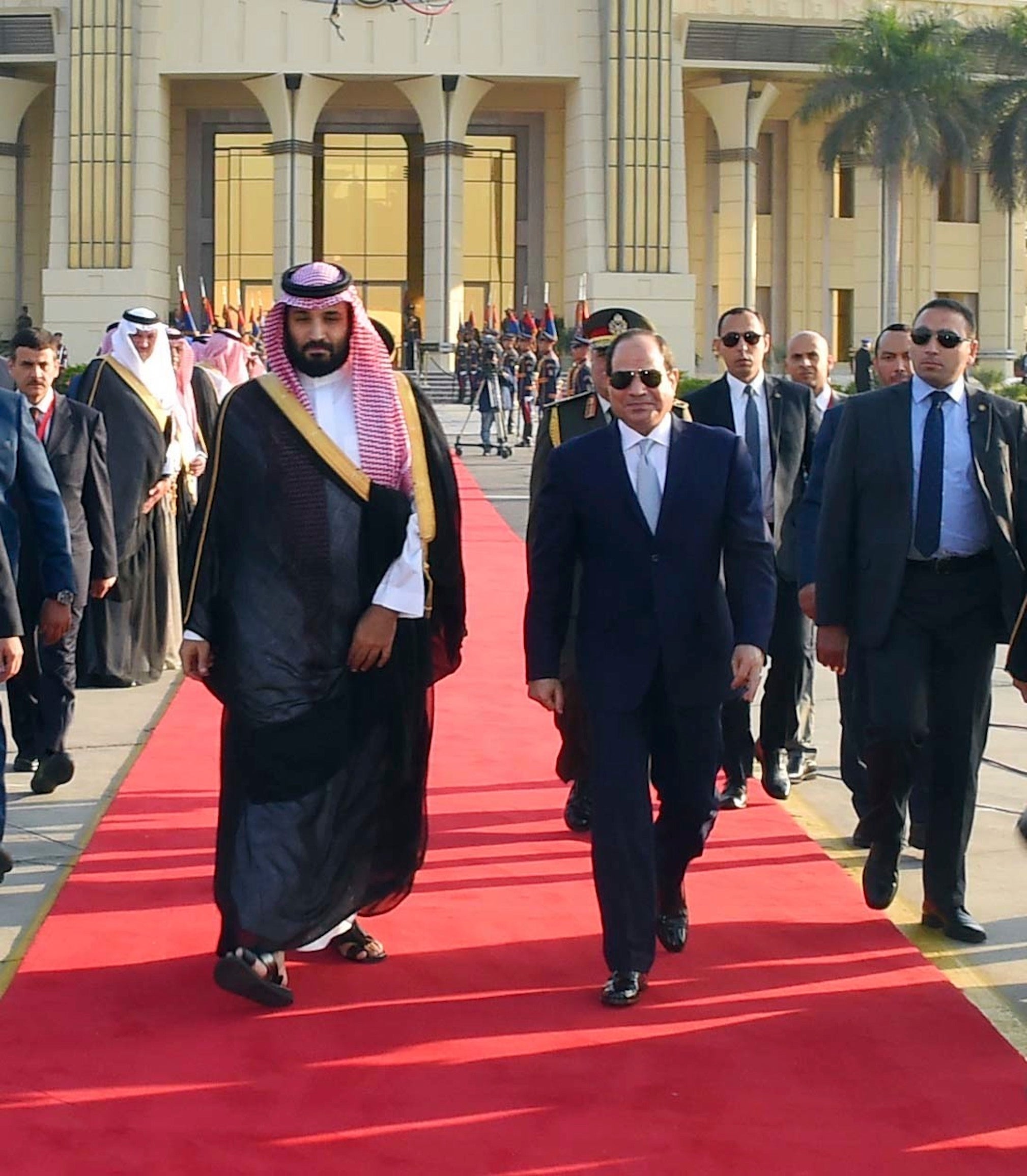Saudi crown prince Mohammad bin Salman becomes lightning rod of division as he tours region
‘He’s a very dangerous person because he doesn’t seem to understand politics or respect his own people or other people’

Your support helps us to tell the story
From reproductive rights to climate change to Big Tech, The Independent is on the ground when the story is developing. Whether it's investigating the financials of Elon Musk's pro-Trump PAC or producing our latest documentary, 'The A Word', which shines a light on the American women fighting for reproductive rights, we know how important it is to parse out the facts from the messaging.
At such a critical moment in US history, we need reporters on the ground. Your donation allows us to keep sending journalists to speak to both sides of the story.
The Independent is trusted by Americans across the entire political spectrum. And unlike many other quality news outlets, we choose not to lock Americans out of our reporting and analysis with paywalls. We believe quality journalism should be available to everyone, paid for by those who can afford it.
Your support makes all the difference.An international tour by Saudi Arabia’s de facto leader was meant to show off his continued prowess and influence. It has instead highlighted the Arab world’s stark divisions over Crown Prince Mohammad bin Salman.
Hundreds of protesters demonstrated against the arrival of Crown Prince Mohammad to Tunisia’s capital on Tuesday afternoon, marching along the same Habib Bourguiba avenue that was the symbolically significant site of the 2011 uprising which overthrew the country’s longtime dictator and ignited nearly eight years of unrest across the region.
“The people want the riddance of Bin Salman,” they chanted, in a play on a 2011 Arab Spring slogan demanding the downfall of dictatorships. Eyewitnesses described and videos showed men and women of Tunisia’s various political and cultural strains – Islamists, leftists, nationalists, and feminists – at the protest.
“Tunisia is free!” they cried, holding up hacksaws of the sort believed to have been used in the killing and dismemberment of journalist Jamal Khashoggi by Saudi agents last month. “Bin Salman! Go away!”
More protesters are expected when he arrives later this week in Algeria. Human Rights Watch has urged prosecutors in Argentina to file a war crimes complaint against the Saudi heir to the throne over his nation’s conduct in the Yemen conflict. He is expected to arrive in the South American country on 30 November for a G20 summit.
The public outcries came as the 33-year-old made his first foray outside the four Arab dictatorships that make up his bloc following the brutal killing and dismemberment of Khashoggi in the Saudi consulate in Istanbul at the alleged hands of royal court operatives.
The administration of Donald Trump has bet big on Crown Prince Mohammad as a cornerstone for its vague plans to unify the Arab world behind its Israeli-Palestinian peace plan, its confrontation against Iran, and to combat Sunni extremism.
But US officials have watched with dismay as the crown prince has squandered much of the goodwill he generated in pricey PR schemes to package himself as a reformer and moderniser.

“He’s a very dangerous person because he doesn’t seem to understand politics or respect his own people or other people,” said Radwan Masmoudi, president of Tunisia’s Centre for the Study of Islam and Democracy, and among those protesting Crown Prince Mohammad’s visit. “There’s no way he’ll bring stability. His actions speak louder than his words.”
There have been few indications that the Khashoggi affair has chastened or softened Crown Prince Mohammad’s erratic policies, as some Saudi commentators optimistically predicted. He has yet to release civil society activists he locked up on dubious national security charges, nor loosen up political restrictions that don’t allow mild dissent.
In Cairo on Tuesday, where the monarch was welcomed by a few dozen protesters holding up Saudi and Egyptian flags in Tahrir Square, the crown prince and Egyptian president Abdel Fattah el-Sisi vowed to continue their 17-month effort to isolate and blockade Qatar, the small energy rich Arabian Peninsula country that has pursued an independent foreign policy.

As Mr Sisi and Prince Mohammad embraced, Qatari emir Tamim bin Hamad al-Thani wrapped up a high-profile trip to Turkey, where he solidified his partnership with president Recep Tayyip Erdogan, who is increasingly countering US policies in the Middle East. On Tuesday, Qatar’s national airline announced that it was increasing air connections to Iranian cities at the same time the US is trying to isolate Iran.
Despite the complications that Crown Prince Mohammad’s moves have created, the Trump administration has stood by him. Still he has become toxic even in the White House. A source close to his chief of protocol, Khalifa bin Salifa, told The Independent he has sought to to wrangle a photo opportunity with Mr Trump during the summit in Buenos Aires, but has been rebuffed so far.
While Egypt, which has received billions in Saudi aid, and cash-strapped Tunisia, which has also benefited from Riyadh’s largesse, may be compelled to cosy up to Crown Prince Mohammad, western leaders have been more hesitant.
“This is a tour to help Prince Mohammad’s reputation and to signify that he still has influence and power in the region as a whole,” said one Tunis-based analyst who is working on sensitive research and asked not to be named. “Tunisia economically is in a rough situation and doesn’t have the luxury of saying no.”
Local media reported on Tuesday that Saudi Arabia is considering giving $2bn dollars, discounted oil and weapons to Tunis in exchange for the visit.
Join our commenting forum
Join thought-provoking conversations, follow other Independent readers and see their replies
Comments